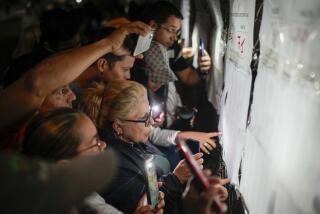Skepticism Greets Zimbabwe Vote, but Little Violence Seen
- Share via
KAKONO, Zimbabwe — The 57-year-old woman, whose days are filled with caring for the four children of a daughter who died of AIDS, had walked to the polling station Thursday feeling that in her village, voting for the opposition was just “not allowed.”
But as she stepped into the booth, the unemployed grandmother felt a surge of freedom, she said, and cast a vote against President Robert Mugabe’s ZANU-PF party.
“I was determined to vote for the party I want because I’m hoping for things to change and a better life,” said the woman, who gave her name only as Beauty for fear of reprisal. She nervously handled a tin for catching worms, bait for the fish she hoped to catch to feed her grandchildren.
“If the ZANU-PF youth see me talking to you, I’ll be in big trouble,” she murmured.
Zimbabweans went to the polls to elect 120 legislators to the 150-seat parliament in an election that saw less violence than in past campaigns. Mugabe’s party said the conditions of the vote were free and fair, but critics accused ZANU-PF of abuses that included intimidation, inflated voter rolls and partisan redistricting.
Critics allege that the rolls contained as many as 2 million invalid names, and the redrawing of electoral boundaries is said to have been driven by the ruling party’s electoral strategy. The European Union and Australia have declared Thursday’s proceedings a sham.
Although election day avoided the bloodshed of the previous parliamentary election in 2000, when violence mostly ascribed to ZANU-PF henchmen claimed 300 lives, there was widespread fear that after foreign journalists and observers went home, the government would punish voters who openly backed the opposition Movement for Democratic Change.
This year, the ruling party is able to tabulate how each community voted, leaving open the possibility of targeted violence against opposition strongholds. Some villages fear they will be deprived of food, which the government largely controls.
Alfred Madzongwe, an MDC activist here in the village of Kakono, a ZANU-PF stronghold 30 miles south of Harare, Zimbabwe’s capital, has good reason to fear. Several weeks ago ZANU-PF members burned down three homes he owned, he said.
“They said that after the elections they’ll take me to their offices and beat me. They said, ‘Then you are the one who is going to tell us the other MDC supporters.’
“I’m afraid.... But I cannot leave the MDC because people are suffering in this country.”
In his campaign this year, Mugabe reprised the rhetoric of Zimbabwe’s anti-colonial war of the 1970s but put minimal emphasis on the poverty, joblessness and triple-digit inflation that now plague the country.
The MDC has promised to turn the economy around and end Zimbabwe’s isolation from the world community. MDC leader Morgan Tsvangirai accused ZANU-PF of starving the nation’s people and pointedly asked what the purpose of the liberation struggle had been.
A prime goal of the ruling party is to draw a two-thirds majority of the vote, which would enable it to amend the constitution and appoint the 81-year-old Mugabe’s successor without having to call an early election.
Mugabe is empowered to appoint 30 members of parliament, making it difficult for the MDC to ever gain a majority. The opposition party won 57 seats in 2000 but has lost six in by-elections since then.
Political commentator Iden Wetherell of the Independent newspaper said the MDC would be lucky to get 40 seats. “I would flag that as a big success for them given the odds,” he said.
The Zimbabwe Election Support Network, or ZESN, an umbrella group that fielded about 6,000 observers to cover the 8,000 voting stations, reported instances of intimidation in which ZANU-PF activists recorded the names and other information of those who came out to vote.
David Coltart, an MDC candidate from the Bulawayo area, called the threat of violence and other reprisals against communities that supported the opposition “a major concern, especially in the rural areas in the context of food shortages.”
But ZANU-FP official Caseas Chishiri said he had never heard of a case in which people were denied food on the basis of political loyalties. He said the data on how each community voted would help the government keep in touch with the people.
He denied that punishment was in store for opposition communities. “We have been persuading people, not punishing them.”
One of the most serious concerns reported by ZESN and the MDC was the many people who were assisted in voting, having declared they could not read, and the high numbers turned away.
A ZESN spokesman said many people were prevented from casting ballots because they appeared at the wrong polling locations as a result of government redistricting.
An MDC spokeswoman said it was odd that in a country with Zimbabwe’s high literacy rate, as many as 15% were helped to vote in some areas. The process involves an election official making the selections based on the voter’s stated preferences.
Under current conditions, there are concerns that Zimbabweans are unlikely to freely express a choice for the opposition to officials who are tied to the central government.
Tsvangirai said he hoped his party would overcome the barriers it faced. “We agree on all benchmarks that this is not going to be a free and fair election,” he said after he cast his vote.
More to Read
Sign up for Essential California
The most important California stories and recommendations in your inbox every morning.
You may occasionally receive promotional content from the Los Angeles Times.













